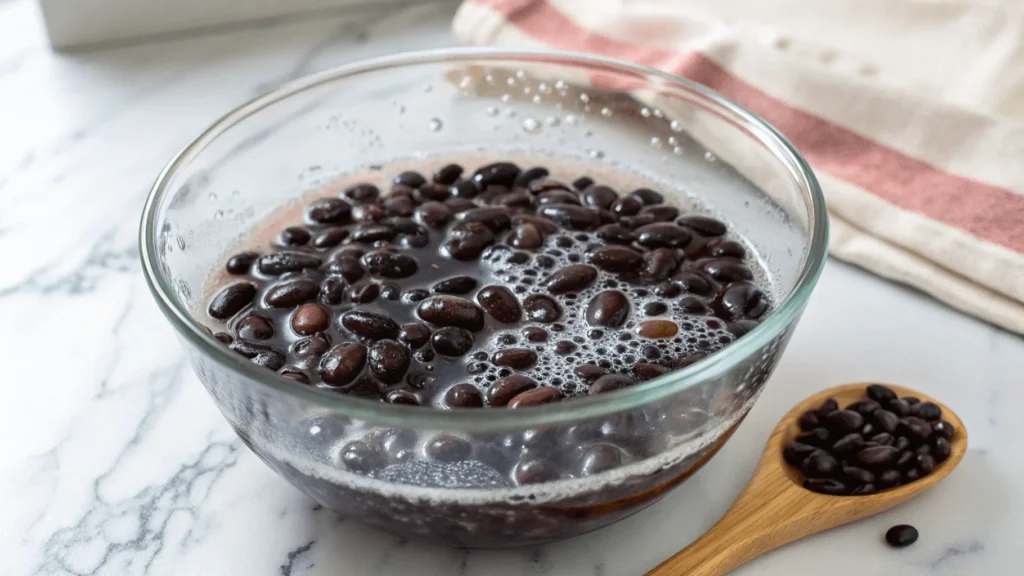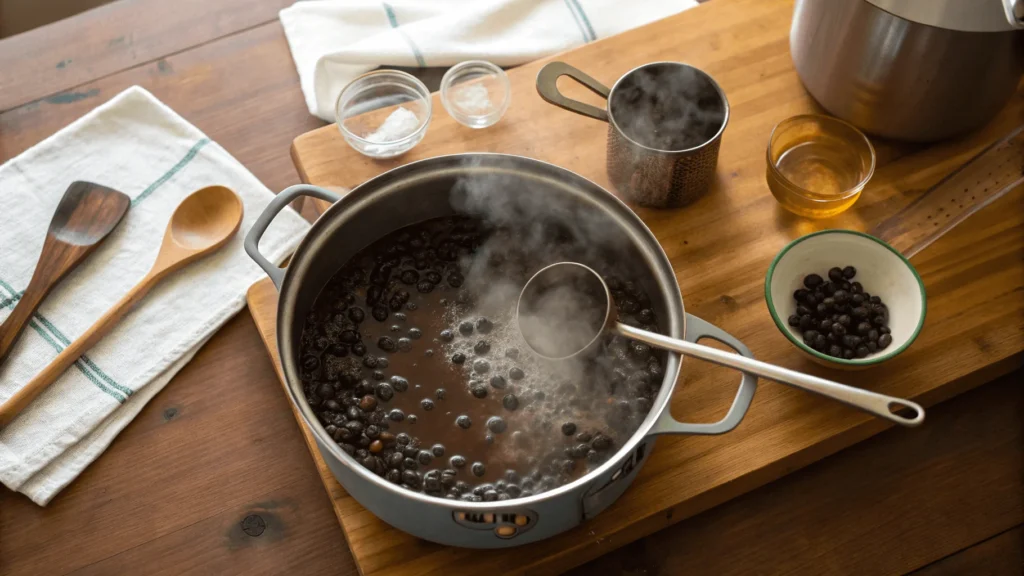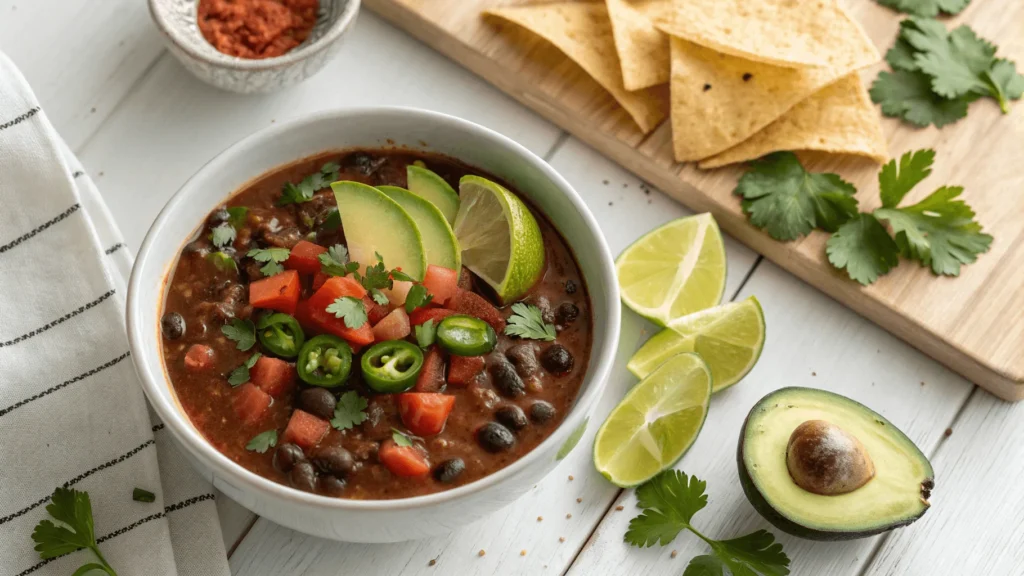Black beans are a staple ingredient in countless cuisines worldwide, celebrated for their rich flavor, versatility, and nutritional benefits. Whether you’re preparing a hearty black bean soup, a zesty chili, or a comforting stew, these legumes are a go-to for home cooks and professional chefs alike. However, when it comes to cooking dried black beans, one question always sparks debate: Do you have to soak black beans before making soup? Some argue that soaking is essential for reducing cooking time and improving digestibility, while others believe it’s an unnecessary step, especially with modern cooking methods. In this article, we’ll explore the science, pros, cons, and practical tips for cooking black beans, both with and without soaking.
Table of Contents
What Does Soaking Black Beans Do?

The Science Behind Soaking Black Beans
When you soak black beans, the process softens their outer skin and allows water to penetrate the dense interior of the bean. This rehydration process jumpstarts cooking, making the beans easier to prepare. Soaking also helps to release oligosaccharides, a type of carbohydrate that can cause gas and bloating when consumed. The result? Beans that cook faster and may be gentler on your stomach.
How Soaking Black Beans Impacts Cooking Time
One of the primary reasons people soak black beans is to reduce cooking time. By allowing the beans to absorb water overnight or for a few hours, you can cut down the time it takes to cook them on the stovetop significantly. For instance, soaked beans may take 45 minutes to an hour to cook, while unsoaked beans could take up to two hours, depending on the method used.
Nutritional Changes from Soaking Black Beans
While soaking has its benefits, it can also lead to minor nutrient loss. Water-soluble vitamins, such as certain B vitamins, may leach out during the soaking process. However, the overall nutritional value of black beans remains high, and soaking doesn’t drastically alter their health benefits. Some argue that the improved digestibility and reduced cooking time outweigh the minimal nutrient loss.
Pros of Soaking Black Beans Before Making Soup
Faster Cooking Time
One of the biggest advantages of soaking black beans is the time saved during cooking. If you’re in a rush or need to prepare a meal quickly, pre-soaking your beans can help you get dinner on the table faster. Explore how timing can impact flavor in soups.
Reduced Gas and Digestive Issues
One of the most common reasons people choose to soak black beans is to reduce the likelihood of digestive discomfort. Beans contain oligosaccharides, which are complex sugars that can be difficult for the body to digest. When these sugars reach the large intestine, they can ferment, causing gas and bloating. Soaking beans helps to release some of these sugars into the soaking water, which is discarded before cooking. For individuals who are sensitive to legumes, this step can make a noticeable difference in how their body responds to black beans.
Enhanced Texture and Flavor
Soaking black beans can also enhance their texture and flavor. Pre-soaked beans tend to cook more evenly, resulting in a creamier, softer texture that’s perfect for soups and stews. Additionally, soaking gives you the opportunity to infuse the beans with flavor. By adding salt, herbs, or spices to the soaking water, you can impart subtle flavors to the beans before they even begin cooking. This can elevate the taste of your black bean soup or any other dish you’re preparing.
Cons of Soaking Black Beans Before Making Soup
Time and Effort Involved
While soaking has its benefits, it does require planning ahead. If you forget to soak your beans the night before, you’ll need to wait at least 6 to 8 hours before they’re ready to cook. For spontaneous cooks, this extra step can feel inconvenient. Learn more about time-efficient methods for cooking beans.
Loss of Nutrients During Soaking Black Beans
As mentioned earlier, soaking can lead to the loss of some water-soluble nutrients, particularly certain B vitamins. While this nutrient loss is relatively minor, it’s worth considering if you’re trying to maximize the nutritional value of your meals. If you’re concerned about this, you might prefer to skip soaking and cook the beans directly, especially if you’re using a nutrient-preserving method like pressure cooking.
The Myth of Improved Digestibility
While soaking is often recommended as a way to reduce digestive discomfort, it’s not a guaranteed solution for everyone. Some individuals may still experience gas or bloating after eating soaked beans, depending on their personal tolerance. Additionally, modern cooking methods, such as using a pressure cooker, can achieve similar results without the need for soaking. Pressure cooking not only reduces oligosaccharides but also shortens cooking time, making it a convenient alternative to soaking. Discover how pressure cooking transforms legumes.
Do You Really Need to Soak Black Beans Before Making Soup?
Modern Cooking Methods: Pressure Cookers and Instant Pots
With advancements in kitchen technology, soaking black beans is no longer as essential as it once was. Pressure cookers and Instant Pots have revolutionized the way we cook dried beans, allowing unsoaked beans to be cooked quickly and efficiently. These appliances can cook unsoaked black beans in as little as 25 to 30 minutes, delivering tender, flavorful results without the need for pre-soaking. For busy home cooks, this is a game-changer, as it eliminates the need to plan ahead.
Comparing Soaked vs. Unsoaked Beans in Soup
Both soaked and unsoaked beans can produce delicious results in soup, but the choice often comes down to personal preference and time constraints. Soaked beans cook faster and may absorb flavors more readily, making them ideal for soups where the beans play a starring role. On the other hand, unsoaked beans can be just as flavorful when cooked low and slow, allowing them to develop a rich, hearty taste. If you’re using a pressure cooker, the difference in texture and flavor between soaked and unsoaked beans is minimal, so you can confidently skip soaking if you’re short on time.
Expert Opinions and Culinary Preferences
Professional chefs and home cooks alike are divided on the soaking debate. Some swear by soaking as a way to improve texture and digestibility, while others argue that it’s an outdated practice, especially with modern cooking tools. Ultimately, the best approach is the one that works for you. If you enjoy the process of soaking and feel it enhances your cooking, there’s no reason to stop. But if you prefer a more streamlined approach, cooking unsoaked beans is a perfectly acceptable—and often equally delicious—alternative.
How to Cook Black Beans Without Soaking
Step-by-Step Guide for Cooking Unsoaked Black Beans
Cooking black beans without soaking is simpler than you might think. Start by rinsing the beans thoroughly to remove any dirt or debris. Add them to a large pot with plenty of water, ensuring the beans are fully submerged. Bring the water to a boil, then reduce the heat to a gentle simmer. Cook the beans for 1.5 to 2 hours, checking for doneness periodically. Add salt and seasonings during the last 30 minutes of cooking.

Tips for Perfectly Cooked Beans Every Time
To ensure your beans cook evenly, stir them occasionally and add more water if needed. Avoid adding acidic ingredients, like tomatoes or vinegar, until the beans are fully cooked, as these can toughen their skins. If you’re short on time, consider using a pressure cooker—it can cook unsoaked beans in as little as 30 minutes.
How to Cook Soaked Black Beans for Soup
Preparing Soaked Beans for Soup
After soaking your black beans, it’s essential to drain and rinse them thoroughly. This step is crucial as it helps to remove any residual oligosaccharides that can lead to digestive discomfort, making your soup more enjoyable and easier on the stomach. Once rinsed, add the beans to your soup pot along with your other ingredients, such as a variety of fresh vegetables, flavorful broth, and aromatic spices. This combination not only enhances the nutritional profile of your soup but also contributes to a rich and satisfying flavor. Stir the ingredients gently to ensure even distribution, allowing the beans to absorb the delicious flavors of the broth and spices as they cook.
Best Practices for Retaining Flavor and Nutrients
To retain the beans’ natural flavor and essential nutrients, it is important to avoid overcooking them. Soaked beans typically take about 45 minutes to an hour to cook, depending on the specific recipe and the desired texture. Monitoring the cooking process closely can help achieve the perfect softness without turning the beans mushy. Additionally, season the soup with salt and spices toward the end of the cooking process. This technique enhances the overall flavor profile without compromising the beans’ texture or nutritional value. By following these best practices, you ensure that your black bean soup is not only delicious but also packed with the nutrients your body needs.
Popular Recipes Using Black Beans in Soup

Classic Black Bean Soup Recipe
This hearty and nutritious soup is a staple in many households, cherished for its rich flavor and comforting qualities. To begin, start by sautéing onions, garlic, and bell peppers in a generous splash of olive oil in a large pot. This aromatic base sets the stage for the delightful flavors to come. Once the vegetables are softened and fragrant, add either soaked or unsoaked black beans, along with a good amount of vegetable broth to create a savory depth. Don’t forget to incorporate your favorite spices—consider cumin, paprika, or bay leaves—to elevate the taste. Allow the mixture to simmer gently until the beans are tender, which usually takes about 45 minutes to an hour.
Spicy Mexican Black Bean Soup
For a zesty twist that packs a punch, try a Mexican-inspired black bean soup. Start by combining cooked black beans with diced tomatoes, jalapeños for heat, and a blend of spices like cumin and chili powder to create a flavor explosion. The combination of ingredients brings a vibrant color and taste to the dish. Simmer the mixture to allow the flavors to meld beautifully. Once ready, serve the soup hot, topped with fresh cilantro for a pop of freshness, creamy avocado slices for richness, and a squeeze of lime juice for a burst of brightness.
Vegan Black Bean and Vegetable Soup
This plant-based recipe is loaded with nutrients, making it a wholesome choice for anyone looking to boost their vegetable intake. Start by pairing black beans with a colorful array of vegetables, such as carrots, celery, zucchini, and spinach, which contribute both flavor and texture to the soup. Use vegetable broth as your base to keep it light and nourishing. To enhance the taste, season the soup with smoked paprika for a hint of smokiness, garlic powder for depth, and thyme for an earthy flavor. Allow the soup to simmer until the vegetables are tender and the flavors are well combined.
FAQs About Soaking Black Beans
Do Black Beans Need to Be Rinsed Before Cooking?
Yes, rinsing black beans is an important step before cooking. It helps remove dirt, debris, and any residual preservatives or chemicals that may remain from packaging. Whether you’re using soaked or unsoaked beans, rinsing ensures they’re clean and ready for cooking.
How Long Do Black Beans Take to Cook Without Soaking?
Unsoaked black beans typically take 1.5 to 2 hours to cook on the stovetop. However, using a pressure cooker or an Instant Pot can significantly reduce this time to about 25 to 30 minutes. The exact cooking time may vary depending on the freshness of the beans and your cooking method.
Can You Freeze Cooked Black Beans for Later Use?
Yes, cooked black beans freeze exceptionally well. To freeze them, allow the beans to cool completely, then portion them into airtight containers or freezer bags with some of the cooking liquid to prevent them from drying out. They can be stored in the freezer for up to 3 months and reheated as needed.
Does Soaking Black Beans Reduce Gas?
Soaking black beans can help reduce gas and bloating for some people. The soaking process removes oligosaccharides, the complex sugars that are harder to digest and can cause gas. However, the effectiveness of soaking varies from person to person and may not completely eliminate digestive discomfort.
Is It Better to Cook Black Beans With or Without Soaking?
Both methods have their advantages. Cooking with soaked beans reduces cooking time and may improve texture, while cooking unsoaked beans is more convenient and retains slightly more nutrients. The choice depends on your schedule, tools, and personal preferences.
Can You Add Salt to Black Beans While Cooking?
Yes, but it’s best to add salt toward the end of the cooking process. Adding salt too early can toughen the beans’ skins and lengthen cooking time. Once the beans are tender, season them with salt to enhance their flavor.
Conclusion
So, do you have to soak black beans before making soup? The answer depends on your cooking preferences, available time, and desired results. Soaking black beans can save cooking time, improve texture, and potentially reduce digestive discomfort. However, with modern tools like pressure cookers and Instant Pots, soaking is no longer a necessity for delicious, tender beans. Whether you choose to soak or skip this step, black beans remain a versatile and nutritious ingredient for countless recipes, especially soups.
Ultimately, the decision comes down to convenience and personal taste. If you have the time and prefer the traditional method, soaking can enhance your cooking experience. But if you’re in a rush or want a more hands-off approach, cooking unsoaked beans is just as effective. No matter how you prepare them, black beans are sure to add flavor, nutrition, and heartiness to your next pot of soup.

